For over 20 years, the Carolina Hurricanes player turned coach has ruled the rise of hockey in the Triangle
by Josh Klahre | photography by Bob Karp
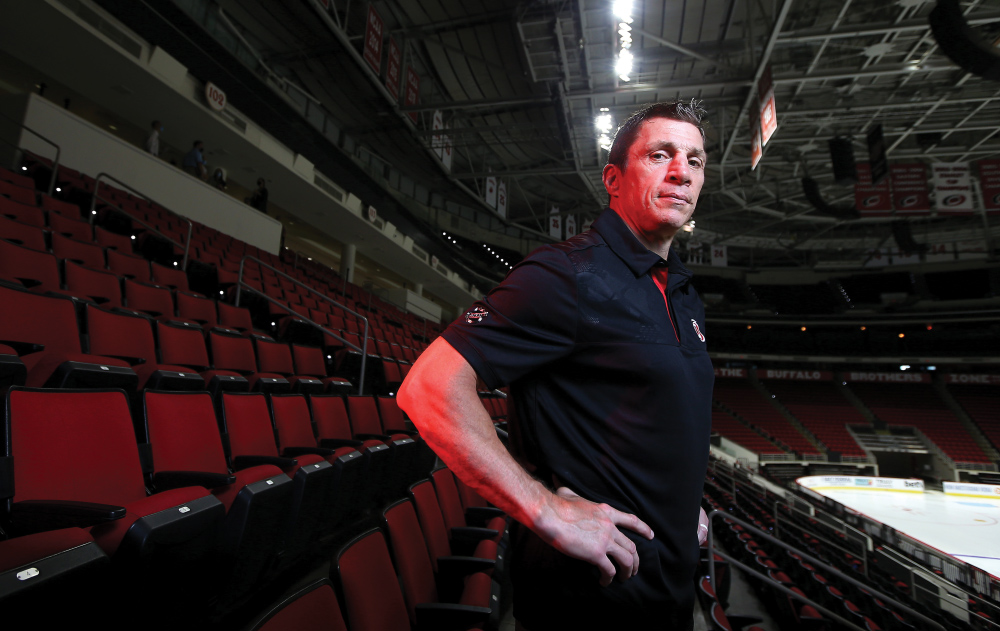
Rod Brind’Amour’s first impression of Raleigh was, he says, “unusual.” He landed in his new hometown in January of 2000, at the start of a rare winter storm that dropped 20 inches of snow in 24 hours. The city was in chaos. And Brind’Amour was trapped in a hotel room on Creedmoor Road for two weeks, with an overnight bag and little else — including, or rather, excluding, his wallet.
The circumstances that led to this predicament fit into a ‘perfect storm’ trope: while on a one-day road trip to Pittsburgh with his former team, the Philadelphia Flyers, Brind’Amour learned that he’d been traded to the Carolina Hurricanes. As is common in pro hockey, the expectation was that he would report to his new team immediately. So he did, hopping a chartered flight back when you could get on without having to present an ID. Coming out of his first game with his new team, “the snow was just coming down and we got snowed in.”
“I was able to bum money until I got my stuff, but I had to go out and get groceries just to make do,” he says. He ventured out to the store to stock up, wearing just a suit and dress shoes, the heaviest clothing in his bag. There, he encountered a line that extended out of the door (in keeping with Raleigh’s reaction to even a flurry). He remembers people in the line bundled up in winter coats studying him, then pushing him up to the front of the line. “No one even knew who I was,” he says, “and I just thought to myself, this wouldn’t happen in Philadelphia — everything’s a little different here, in a positive way!”
Raised in British Columbia, Canada, Brind’Amour was drafted by the St. Louis Blues in 1988 while playing hockey at Michigan State University. He broke into the National Hockey League in a most auspicious fashion, scoring on his first shot in the 1989 playoffs against the Minnesota North Stars. He was traded to Philadelphia in 1990 and played 10 seasons with the Flyers; there, he set a franchise record for playing 484 consecutive games.
At Carolina, Brind’Amour went on to win multiple league accolades and captain the 2006 Stanley Cup championship team. He became the head coach of the Hurricanes in 2018 and led them to the playoffs in all three seasons. And this year, he received the NHL’s Jack Adams Award for coach of the year for his contributions to the Hurricanes’ success.
As he heads into a new season, there’s one word Brind’Amour would use to describe both Raleigh and the hockey enthusiasm here over the last 20 years: growth. He settled into his first home, in North Raleigh, when construction on 540 had just been completed. When a teammate picked him up to show him the way to the arena, Brind’Amour says, “I think we only passed two cars the entire way, and we took the long way!”
When he first moved to town and asked locals for directions to “the rink,” he says, he’d be met with puzzlement: “What’s that?” Having come from Philadelphia, where just about everyone knew where the Flyers played, he was incredulous at having to rephrase his inquiry — “You know, the place where the Carolina Hurricanes play?” — and to even then be met with confusion.
As the team began racking up wins in the early 2000s — including an appearance in the 2002 Stanley Cup Final — the community responded. Games started to sell out, and the Hurricanes’ home ice at the PNC Arena (formerly the RBC Arena) became known around the league as one of the loudest to play in. “It’s 10 times louder here than any other building when it’s full,” says Brind’Amour. “The fans go above and beyond rooting for their team.”
After the Hurricanes won the Stanley Cup in 2006, the city was electrified — and hockey took hold in Raleigh, with a North Carolina twist. “The tailgating before games, that’s just a carryover from college football games, but it’s a really neat thing to see,” says Brind’Amour.
He believes that part of the reason for such a strong fan base here is the fact that it’s the one team everyone can support within a city divided by fierce collegiate loyalties. Plus, it’s a small market, and the players feel connected to their fans. “They understand they need to give a little more than other places, that’s what makes it special,” says Brind’Amour. Team captain Jordan Staal agrees: “We players think about ways to get the fans involved, like the Storm Surge after home wins, because we want our arena to be an experience unlike any other.”
While most of his waking hours are dedicated to hockey, Brind’Amour appreciates how Raleigh offers a great place to raise his family (he has a 9-year-son, Brooks, along with three older children from a previous marriage), easy living, and high-caliber schools. And, of course, access to the mountains and the sea, where, recently, “we took Brooks to hockey camp in the morning, surf camp in the afternoon, and nine holes in the evening.” He credits his wife Amy, a North Carolina native, for “opening my world up to the state.”
Day-to-day, Brind’Amour’s a bit of a homebody. When he’s not at work, it’s “all about family and recharging the battery:” hanging at home, binge-watching shows, sitting down to dinner. It’s partly his personality — he’s a no-nonsense type of person who’s strikingly grounded — and partly the current circumstances (unlike 20 years ago, these days he’s likely to attract a crowd of Hurricanes fans when he shows up at a grocery store).
And he’s got a growing circle of friends from his playing and coaching days to hang with here. “A lot of guys who go around and do their career and then realize, Holy moly… that’s a pretty special place, there!” he says, noting several former players like Sean Hill, Erik Cole, and Tim Gleason, who have come back to the area after they’ve retired. “I love golf and I don’t get to play a lot — but when I can, it’s great to get out with those guys.” Current players are seeking out Raleigh, too, for its competitive team, passionate fan base, and great quality of life: “We used to have to track players down, but now we’ve got players picking up the phone wanting to come here.”
Staal credits Brind’Amour for this change too. “Rod demands respect in the room, for everything he’s done as a player over his career, how he’s first to work every day as our coach, how he’s in better shape than probably half the guys in the locker room,” says Staal. “You want to play hard for a guy who puts that much work into the team.”
In addition to his work with the Hurricanes, Brind’Amour dedicates his time to youth hockey in the Triangle. “I’m at the rink almost every night on the ice with the kids,” he says. “I love it because they play for all the right reasons.” He notes the explosion of interest in the sport within the community. “It’s unbelievable — more and more kids are playing,” he says. “It’s neat to see the growth of the game in an area where a lot of fans didn’t grow up playing hockey, but now you’ve got a new generation of fans that did.” From Staal’s perspective as a 9-year veteran, he agrees: “I only see it getting bigger and better in the future.”
All in all, Brind’Amour says he’s proud of the momentum he’s helped develop with the Hurricanes movement. “When I got here, the team was starting out, and I’ve gotten to see that all the way through,” he says, admitting that he’s passed on lucrative offers to work in bigger markets over the years.
“I’m not the richest coach in the world, but to play somewhere you love is great,” he says, “and to call it your home and to coach there — that’s priceless.”
___
This article originally appeared in the October 2021 issue of WALTER magazine.

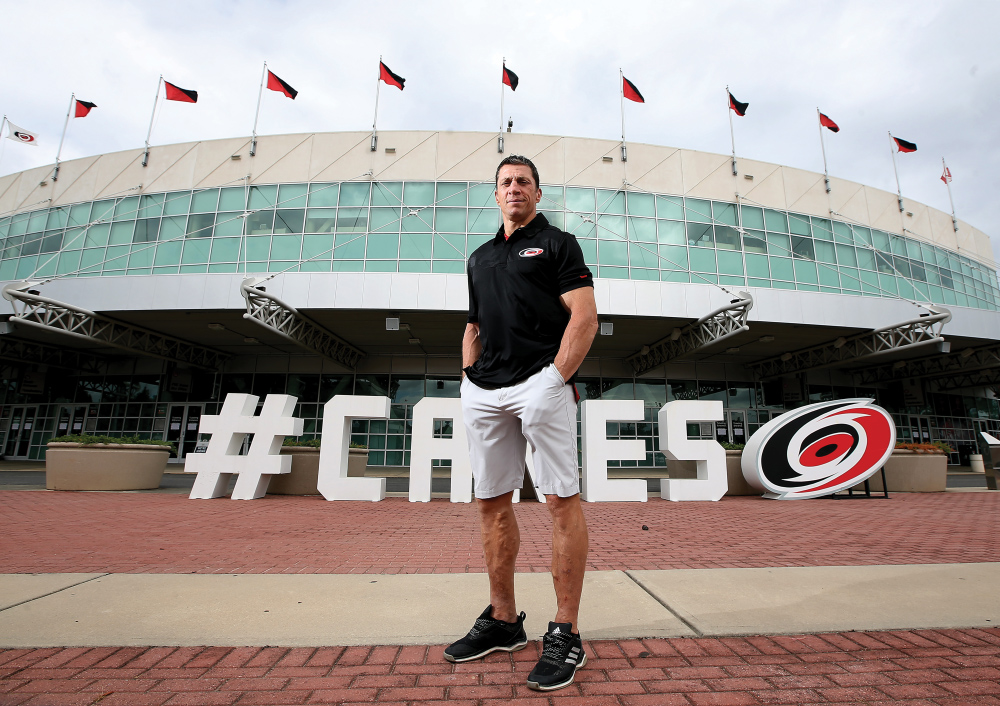
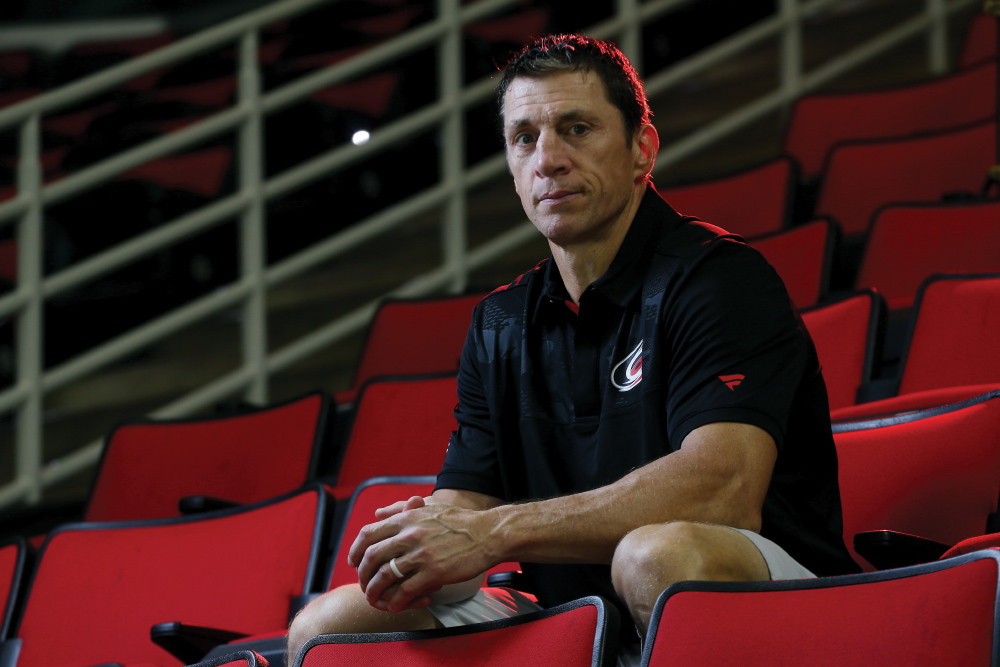
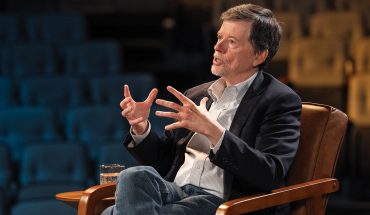

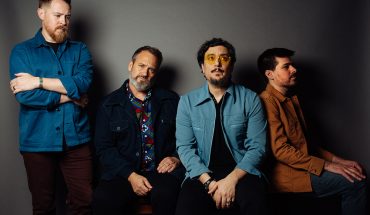
Pingback: 20+ Things to do In October In and Around Raleigh - WALTER Magazine